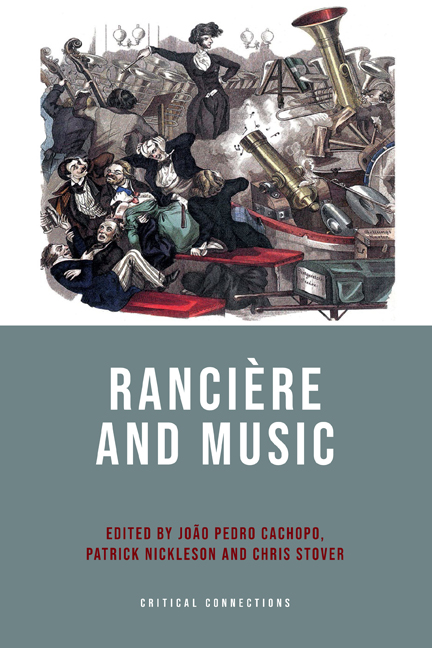Book contents
- Frontmatter
- Contents
- List of Examples
- Acknowledgements
- Notes on Contributors
- Introduction
- Part I: Music and Noise
- 1 Musique concrète and the Aesthetic Regime of Art
- 2 ‘Rip it up and start again’: Reconfigurations of the Audible under the Aesthetic Regime of the Arts
- 3 A Lesson in Low Music
- Part II: Politics of History
- 4 Wandering with Rancière: Sound and Structure under the Aesthetic Regime
- 5 Staging Music in the Aesthetic Regime of Art: Rancière, Berlioz and the Bells of Harold en Italie
- 6 Rancière on Music, Rancière’s Non-music
- 7 Coloured Opera and the Violence of Dis-identification
- Part III: Politics of Interaction
- 8 Musical Politics in the Cuban Police Order
- 9 Rancière and Improvisation: Reading Contingency in Music and Politics
- 10 Rancière’s Affective Impropriety
- Part IV: Encounters and Challenges
- 11 Rancière, Resistance and the Problem of Commemorative Art: Music Displacing Violence Displacing Music
- 12 Stain
- 13 On Shoemakers and Related Matters: Rancière and Badiou on Richard Wagner
- 14 Roll Over the Musical Boundaries: A Few Milestones for the Implementation of an Equal Method in Musicology
- Afterword
- A Distant Sound
- Works Cited
- Index
11 - Rancière, Resistance and the Problem of Commemorative Art: Music Displacing Violence Displacing Music
Published online by Cambridge University Press: 03 October 2020
- Frontmatter
- Contents
- List of Examples
- Acknowledgements
- Notes on Contributors
- Introduction
- Part I: Music and Noise
- 1 Musique concrète and the Aesthetic Regime of Art
- 2 ‘Rip it up and start again’: Reconfigurations of the Audible under the Aesthetic Regime of the Arts
- 3 A Lesson in Low Music
- Part II: Politics of History
- 4 Wandering with Rancière: Sound and Structure under the Aesthetic Regime
- 5 Staging Music in the Aesthetic Regime of Art: Rancière, Berlioz and the Bells of Harold en Italie
- 6 Rancière on Music, Rancière’s Non-music
- 7 Coloured Opera and the Violence of Dis-identification
- Part III: Politics of Interaction
- 8 Musical Politics in the Cuban Police Order
- 9 Rancière and Improvisation: Reading Contingency in Music and Politics
- 10 Rancière’s Affective Impropriety
- Part IV: Encounters and Challenges
- 11 Rancière, Resistance and the Problem of Commemorative Art: Music Displacing Violence Displacing Music
- 12 Stain
- 13 On Shoemakers and Related Matters: Rancière and Badiou on Richard Wagner
- 14 Roll Over the Musical Boundaries: A Few Milestones for the Implementation of an Equal Method in Musicology
- Afterword
- A Distant Sound
- Works Cited
- Index
Summary
‘It is a metaphor which has misled and confused you,’ said Eduard. ‘Here, to be sure, it is only a question of soil and minerals; but man is a true Narcissus: he makes the whole world his mirror.’
This passage is from Goethe's celebrated novella Elective Affinities (1809), where it serves the narrative function of signalling the moment when the link between the title and the central theme of the story becomes explicit. In this part of the story, the subject of discussion between a married couple and their male guest is the meaning of the term ‘affinity’. The guest explains that the term refers to the phenomenon in chemistry and physics where substances (such as water, oil or quicksilver) tend to ‘adhere to themselves’, and even if they are forcibly separated they slide back into each other and create a unity as soon as the external force is removed. By contrast, other materials, such as oil and water, refuse to combine even with force applied. The character of Charlotte observes that the same may be said of social circles, such as where members of certain classes and professions tend towards each other but are repelled by members of other groups. There ensues a discussion of the likeness of these chemical and social tendencies, including the fact that substances that repel one another can be brought together with a mediating substance (as with alkaline salt in the case of oil and water), just as laws and customs can bind together socially disparate individuals.
Observing the likeness between chemical and human activity is, of course, not merely a case of mistaken metaphor or the egotistical projection of human personality on to inanimate objects, as the character of Eduard suggests in the quotation above. Rather, it intimates two claims that will become important for our discussion below. The first is that substances not only come together as a partnership, but rather that in coming together they relinquish the differences that make them individual. An example might be when a raindrop joins a puddle, or when later in Goethe's story the characters of Eduard and Ottilie begin to exhibit the same handwriting, the same idiosyncrasies in musical performance and simultaneous thought processes – they come to mirror each other so closely that it seems as if they were a single character.
- Type
- Chapter
- Information
- Ranciere and Music , pp. 265 - 289Publisher: Edinburgh University PressPrint publication year: 2020



